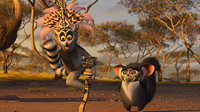Opinions will vary on whether Madagascar: Escape 2 Africa is a better or worse film than its predecessor, or for that matter roughly the same, but about one thing there can be no doubt: The series’ sense of geography has improved, however slightly.
The first film imagined that a bunch of animals from New York City’s Central Park Zoo were put on a boat for Africa, and then the boat was commandeered by penguins heading for the Antarctic, and then the former Zoo-mates, trapped inside some crates, fell overboard and drifted—not to the Atlantic coast of Africa, which presumably would have been fairly close, but to the island of Madagascar, way on the other side of that continent. The second film, thankfully, imagines a much simpler journey. This time, the penguins have found an abandoned plane and “fixed” it for a flight back to New York City. The flight, naturally, takes them over Africa—and when they run out of fuel, they crash-land on the continent below.

The second Madagascar is one of those sequels that brings back just about every character from the earlier film, even if it doesn’t quite make sense, just to keep the chemistry alive. So when the penguins take off in their plane, they do not merely bring with them their fellow New Yorkers—including Alex the performing lion (voice of Ben Stiller), Marty the zebra (Chris Rock), Melman the hypochondriac giraffe (David Schwimmer) and Gloria the hippo (Jada Pinkett Smith). They also bring Julien XIII (Borat‘s Sacha Baron Cohen), the loopy king of the lemurs, who tags along for the ride even though it means basically abandoning his kingdom. And when the plane crash-lands in an African reserve, the animals bump into Nana (Elisa Gabrielli), the old lady who gave Alex a good beating when they crossed paths at Grand Central Station in the first film; by sheer coincidence, she is now in Africa as a tourist.
The second Madagascar is also one of those sequels that conveniently forgets the whole point of the earlier film just so it can tell an entirely different story. The first film revolved around the fact that some animals are carnivores, and the possibility that Alex, as a creature raised in captivity but now stranded in the wild, was beginning to let his natural instincts take over and regard his friends as just another kind of meat. (Like many city boys, Alex had never really thought about where his food came from; by the end of the film, he had learned to eat sushi instead of steaks, apparently because fish aren’t potential friends like all the other animals.) But the sequel pretty much abandons that theme, even though it acknowledges the scar on Marty’s rear end where Alex once tried to take a bite out of him. When the plane crashes in the reserve, Alex and his friends discover whole tribes of lions, zebras, giraffes and hippopotami—and they all live in perfect peace and harmony.

Well, perhaps not that much peace and harmony. The various tribes leave each other alone, all right, but within at least one of those tribes, there is some conflict. Alex discovers—in yet another coincidence—that the leader of the lions is none other than Zuba (Bernie Mac), the father he had forgotten he ever had. (Long story short: Alex was born in the wild, hunters intervened when he was just a cub, and he ended up in a crate—yes, another lost-at-sea crate—floating into New York City, where he was found and taken in by the zoo. Okay, so the geography is still a bit iffy.) Zuba and his wife (Sherri Shepherd) are overjoyed to be reunited with Alex, and he with them—but, in a plot twist lifted straight out of The Lion King, Zuba also has a brother, Makunga (Alec Baldwin), who is itching to lead the lions in Zuba’s place. And Makunga believes he can use Alex’s unexpected arrival to achieve that very goal.
But that’s not the only story that unfolds. Melman, always neurotically obsessed with wellness, agrees to become a “witch doctor” to the other giraffes—though his diagnoses and prescriptions sound an awful lot like modern medicine. He also frets over whether to confess his love to Gloria, now that a hunky, or at least chunky, male hippo has begun to attract her attention. And Marty discovers that all the other zebras look, sound, and act just like him—so he worries that he is not unique. Meanwhile, the penguins, led as ever by the wily Skipper (co-director Tom McGrath), try to rebuild the plane with help from local monkeys, but they get bogged down in labor negotiations. And Nana leads a group of lost tourists deep into the wild.

Thanks to all these story threads, it is difficult to find an overarching theme, though a few ideas do recur, such as the nature of authority and the relationship between theater, storytelling and political and religious ceremonies: the other tourists follow Nana because she acts like she knows what she’s doing; Alex squabbles with the penguins over who should be in charge, after their plane has crashed; the lions stage fights as a rite of passage; and the lemur Julien, in his typically pompous and kooky way, suggests sacrificing someone to the “water gods” when the river runs dry.
But even if no theme dominates the film as a whole, various moments throughout the film are often quite funny in their own right. Some of the gags may be a bit edgy or cheeky for younger children—for example, when the monkeys demand maternity-leave rights, Skipper peeks under the desk and says that all the monkeys are male—but it’s got a zany charm all its own, and its CGI depiction of the African continent is quite beautiful at times. Madagascar: Escape 2 Africa is definitely not a film for the ages, and you might not even remember it by the end of the year, but as it is, it’s a reasonably pleasant, amusing and diverting bit of animation.
>Talk About It
Discussion starters- Alex keeps referring to himself as the “King of New York,” because that’s his stage name—but his father mistakes it for a sign of physical power. How is theater and fake power not really power at all? How can it become a kind of power?
- Marty worries that he isn’t unique, because all the other zebras are just like him. How important is it to be different from others? Is it comforting to find others who are just like you? When does it cease to be comforting?
- Is it significant that the main thing which sets Marty apart from the others is his scar? How do our “scars” define us?
- What does the film say about the nature of authority? Why do people follow Nana into the wild? Why do the lions follow one alpha male and not another? Why do the giraffes take medical advice from Melman? Why do the animals take Julien’s suggestion seriously, that one of them should be sacrificed to the “water gods”?
- What does the film say about human relationships? Does it matter that a giraffe is in love with a hippo? Does it matter that a penguin is in love with a wooden doll? Does it matter that someone says of one of these relationships, “Love transcends all differences”?
The Family Corner
For parents to considerMadagascar: Escape 2 Africa is rated PG for some mild crude humor, including gags about inter-species romantic attraction (and one animal’s affection for a wooden doll), and a scene in which an animal checks under a table to see what gender some other animals are, among other things. The animals also steer a couple of vehicles into a seemingly indestructible old lady who has beaten some of them up. Most giraffes assume that they should go to a “dying hole” and die when they are ill. And a shark pursues a small furry creature—not only at sea, but on dry land too.
Photos © Copyright DreamWorks Animation
Copyright © 2008 Christianity Today. Click for reprint information.











